Developing a Framework for Managing Corruption in Libyan Oil and Gas
VerifiedAdded on 2020/05/28
|59
|19122
|214
Report
AI Summary
This report examines the significant issue of corruption within Libya's oil and gas sector, emphasizing the industry's global scale, complex operations, and contractual connections. It highlights the increasing concern of bribery and corruption, particularly in developing nations like Libya due to weak legal systems. The report aims to develop a corruption management framework tailored for Libya, considering its reliance on oil and gas revenue and the challenges posed by its legal system rooted in Islamic law. It analyzes the country's political and economic context, including its history of colonization, civil war, and the impact of oil wealth, including the 'resource curse'. The report also discusses the need for strong institutions to mitigate corruption risks and ensure sustainable economic development, providing insights into the causes and consequences of corruption in the sector and offering a framework for effective management and anti-corruption policies.
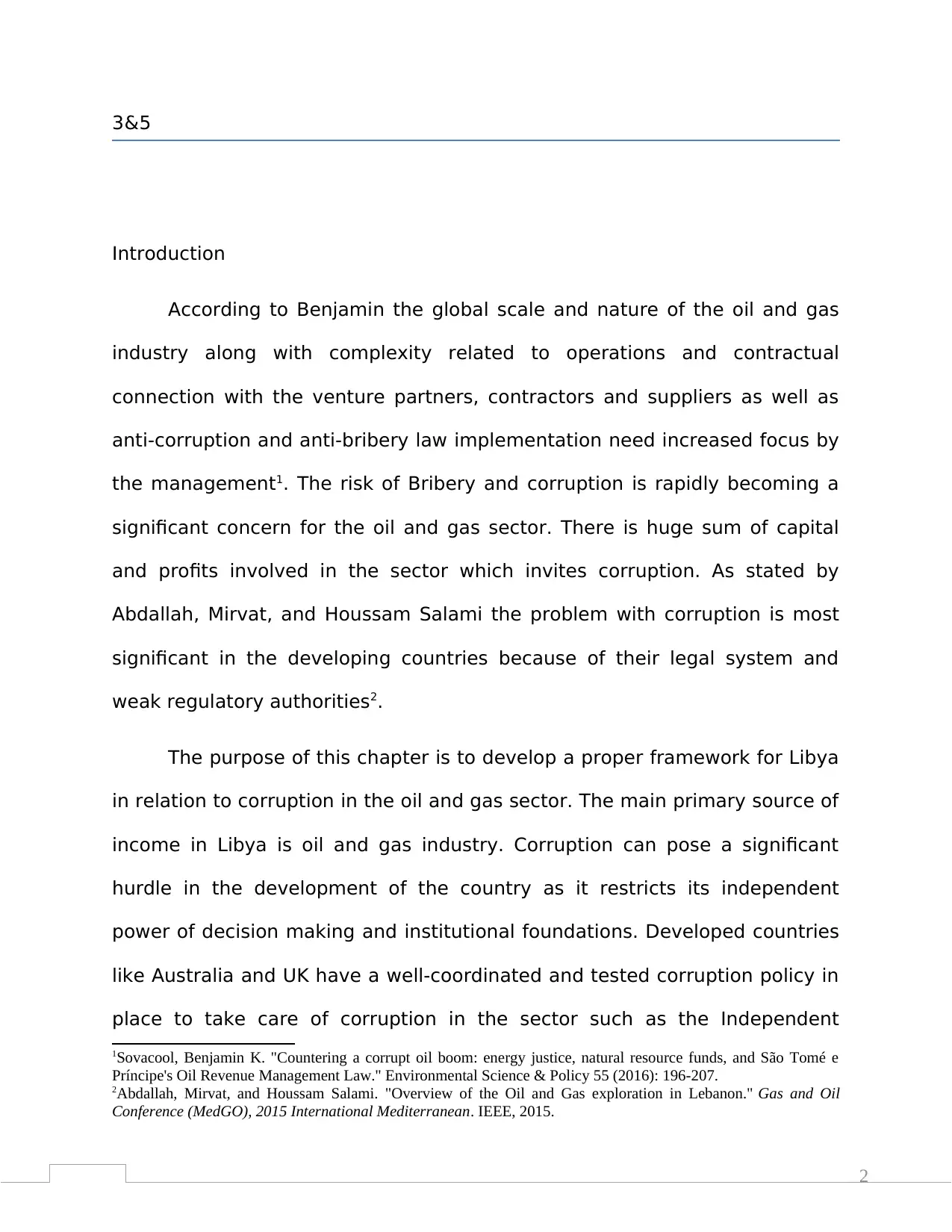
2
3&5
Introduction
According to Benjamin the global scale and nature of the oil and gas
industry along with complexity related to operations and contractual
connection with the venture partners, contractors and suppliers as well as
anti-corruption and anti-bribery law implementation need increased focus by
the management1. The risk of Bribery and corruption is rapidly becoming a
significant concern for the oil and gas sector. There is huge sum of capital
and profits involved in the sector which invites corruption. As stated by
Abdallah, Mirvat, and Houssam Salami the problem with corruption is most
significant in the developing countries because of their legal system and
weak regulatory authorities2.
The purpose of this chapter is to develop a proper framework for Libya
in relation to corruption in the oil and gas sector. The main primary source of
income in Libya is oil and gas industry. Corruption can pose a significant
hurdle in the development of the country as it restricts its independent
power of decision making and institutional foundations. Developed countries
like Australia and UK have a well-coordinated and tested corruption policy in
place to take care of corruption in the sector such as the Independent
1Sovacool, Benjamin K. "Countering a corrupt oil boom: energy justice, natural resource funds, and São Tomé e
Príncipe's Oil Revenue Management Law." Environmental Science & Policy 55 (2016): 196-207.
2Abdallah, Mirvat, and Houssam Salami. "Overview of the Oil and Gas exploration in Lebanon." Gas and Oil
Conference (MedGO), 2015 International Mediterranean. IEEE, 2015.
3&5
Introduction
According to Benjamin the global scale and nature of the oil and gas
industry along with complexity related to operations and contractual
connection with the venture partners, contractors and suppliers as well as
anti-corruption and anti-bribery law implementation need increased focus by
the management1. The risk of Bribery and corruption is rapidly becoming a
significant concern for the oil and gas sector. There is huge sum of capital
and profits involved in the sector which invites corruption. As stated by
Abdallah, Mirvat, and Houssam Salami the problem with corruption is most
significant in the developing countries because of their legal system and
weak regulatory authorities2.
The purpose of this chapter is to develop a proper framework for Libya
in relation to corruption in the oil and gas sector. The main primary source of
income in Libya is oil and gas industry. Corruption can pose a significant
hurdle in the development of the country as it restricts its independent
power of decision making and institutional foundations. Developed countries
like Australia and UK have a well-coordinated and tested corruption policy in
place to take care of corruption in the sector such as the Independent
1Sovacool, Benjamin K. "Countering a corrupt oil boom: energy justice, natural resource funds, and São Tomé e
Príncipe's Oil Revenue Management Law." Environmental Science & Policy 55 (2016): 196-207.
2Abdallah, Mirvat, and Houssam Salami. "Overview of the Oil and Gas exploration in Lebanon." Gas and Oil
Conference (MedGO), 2015 International Mediterranean. IEEE, 2015.
Paraphrase This Document
Need a fresh take? Get an instant paraphrase of this document with our AI Paraphraser
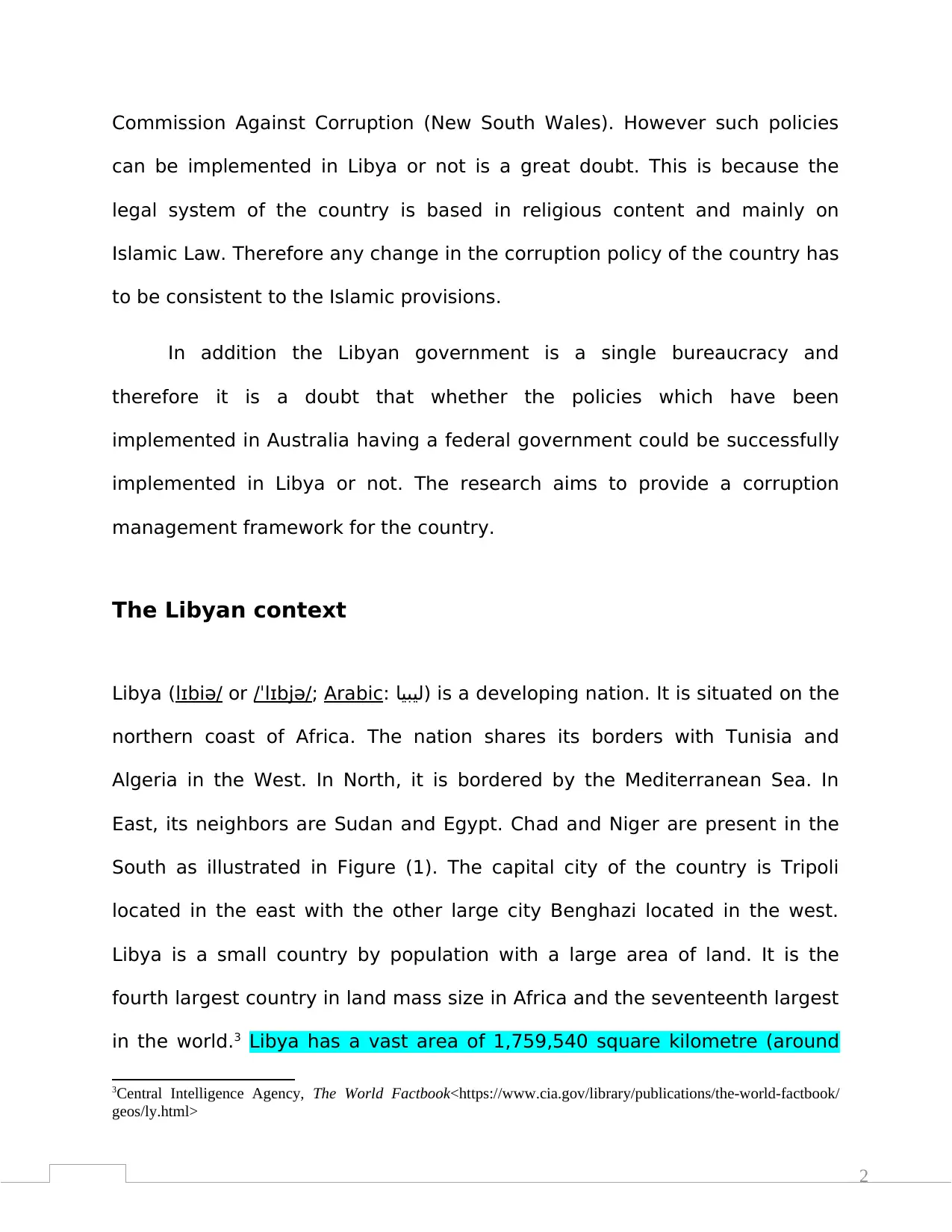
2
Commission Against Corruption (New South Wales). However such policies
can be implemented in Libya or not is a great doubt. This is because the
legal system of the country is based in religious content and mainly on
Islamic Law. Therefore any change in the corruption policy of the country has
to be consistent to the Islamic provisions.
In addition the Libyan government is a single bureaucracy and
therefore it is a doubt that whether the policies which have been
implemented in Australia having a federal government could be successfully
implemented in Libya or not. The research aims to provide a corruption
management framework for the country.
The Libyan context
Libya (lɪbiə/ or /ˈlɪbjə/; Arabic: ليبيا) is a developing nation. It is situated on the
northern coast of Africa. The nation shares its borders with Tunisia and
Algeria in the West. In North, it is bordered by the Mediterranean Sea. In
East, its neighbors are Sudan and Egypt. Chad and Niger are present in the
South as illustrated in Figure (1). The capital city of the country is Tripoli
located in the east with the other large city Benghazi located in the west.
Libya is a small country by population with a large area of land. It is the
fourth largest country in land mass size in Africa and the seventeenth largest
in the world.3 Libya has a vast area of 1,759,540 square kilometre (around
3Central Intelligence Agency, The World Factbook<https://www.cia.gov/library/publications/the-world-factbook/
geos/ly.html>
Commission Against Corruption (New South Wales). However such policies
can be implemented in Libya or not is a great doubt. This is because the
legal system of the country is based in religious content and mainly on
Islamic Law. Therefore any change in the corruption policy of the country has
to be consistent to the Islamic provisions.
In addition the Libyan government is a single bureaucracy and
therefore it is a doubt that whether the policies which have been
implemented in Australia having a federal government could be successfully
implemented in Libya or not. The research aims to provide a corruption
management framework for the country.
The Libyan context
Libya (lɪbiə/ or /ˈlɪbjə/; Arabic: ليبيا) is a developing nation. It is situated on the
northern coast of Africa. The nation shares its borders with Tunisia and
Algeria in the West. In North, it is bordered by the Mediterranean Sea. In
East, its neighbors are Sudan and Egypt. Chad and Niger are present in the
South as illustrated in Figure (1). The capital city of the country is Tripoli
located in the east with the other large city Benghazi located in the west.
Libya is a small country by population with a large area of land. It is the
fourth largest country in land mass size in Africa and the seventeenth largest
in the world.3 Libya has a vast area of 1,759,540 square kilometre (around
3Central Intelligence Agency, The World Factbook<https://www.cia.gov/library/publications/the-world-factbook/
geos/ly.html>
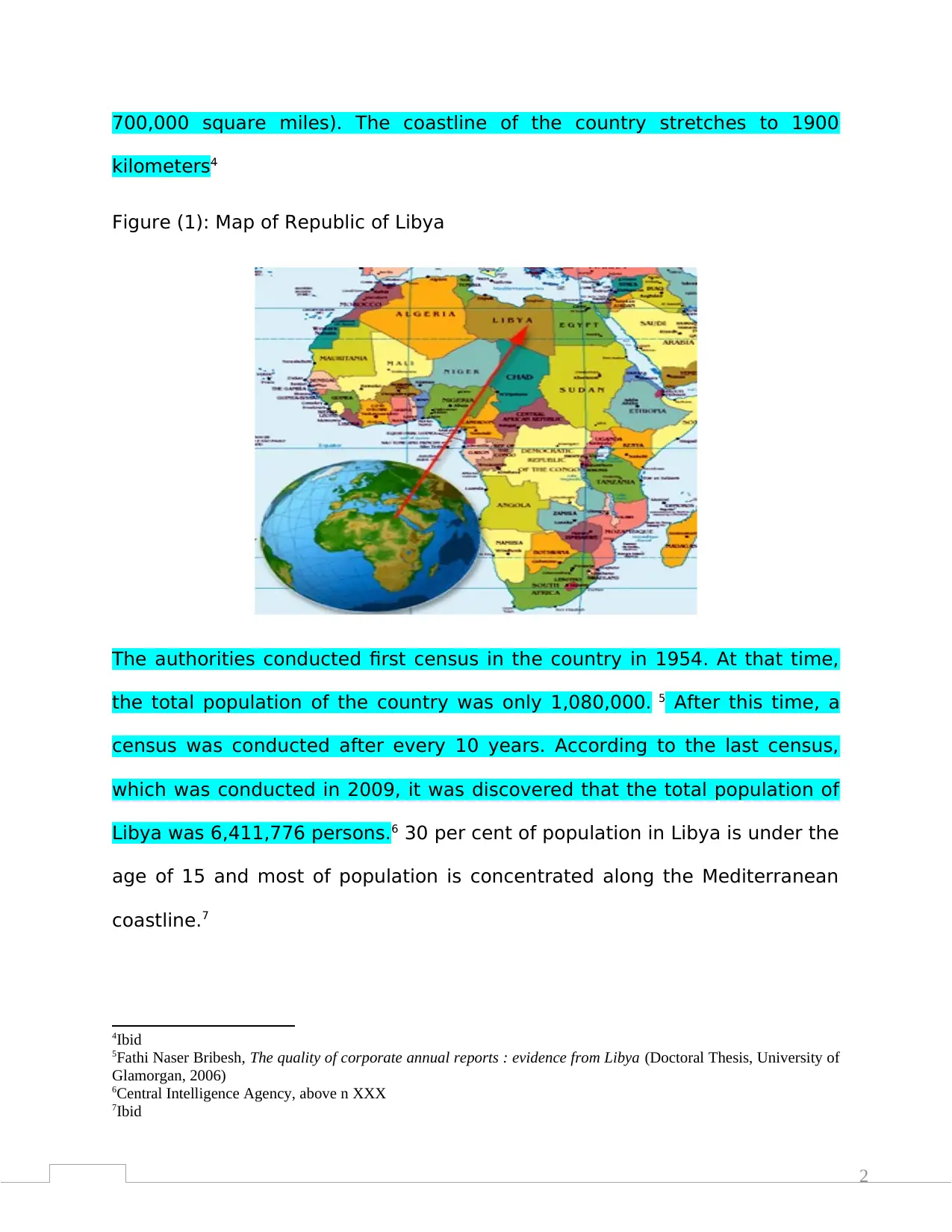
2
700,000 square miles). The coastline of the country stretches to 1900
kilometers4
Figure (1): Map of Republic of Libya
The authorities conducted first census in the country in 1954. At that time,
the total population of the country was only 1,080,000. 5 After this time, a
census was conducted after every 10 years. According to the last census,
which was conducted in 2009, it was discovered that the total population of
Libya was 6,411,776 persons.6 30 per cent of population in Libya is under the
age of 15 and most of population is concentrated along the Mediterranean
coastline.7
4Ibid
5Fathi Naser Bribesh, The quality of corporate annual reports : evidence from Libya (Doctoral Thesis, University of
Glamorgan, 2006)
6Central Intelligence Agency, above n XXX
7Ibid
700,000 square miles). The coastline of the country stretches to 1900
kilometers4
Figure (1): Map of Republic of Libya
The authorities conducted first census in the country in 1954. At that time,
the total population of the country was only 1,080,000. 5 After this time, a
census was conducted after every 10 years. According to the last census,
which was conducted in 2009, it was discovered that the total population of
Libya was 6,411,776 persons.6 30 per cent of population in Libya is under the
age of 15 and most of population is concentrated along the Mediterranean
coastline.7
4Ibid
5Fathi Naser Bribesh, The quality of corporate annual reports : evidence from Libya (Doctoral Thesis, University of
Glamorgan, 2006)
6Central Intelligence Agency, above n XXX
7Ibid
⊘ This is a preview!⊘
Do you want full access?
Subscribe today to unlock all pages.

Trusted by 1+ million students worldwide
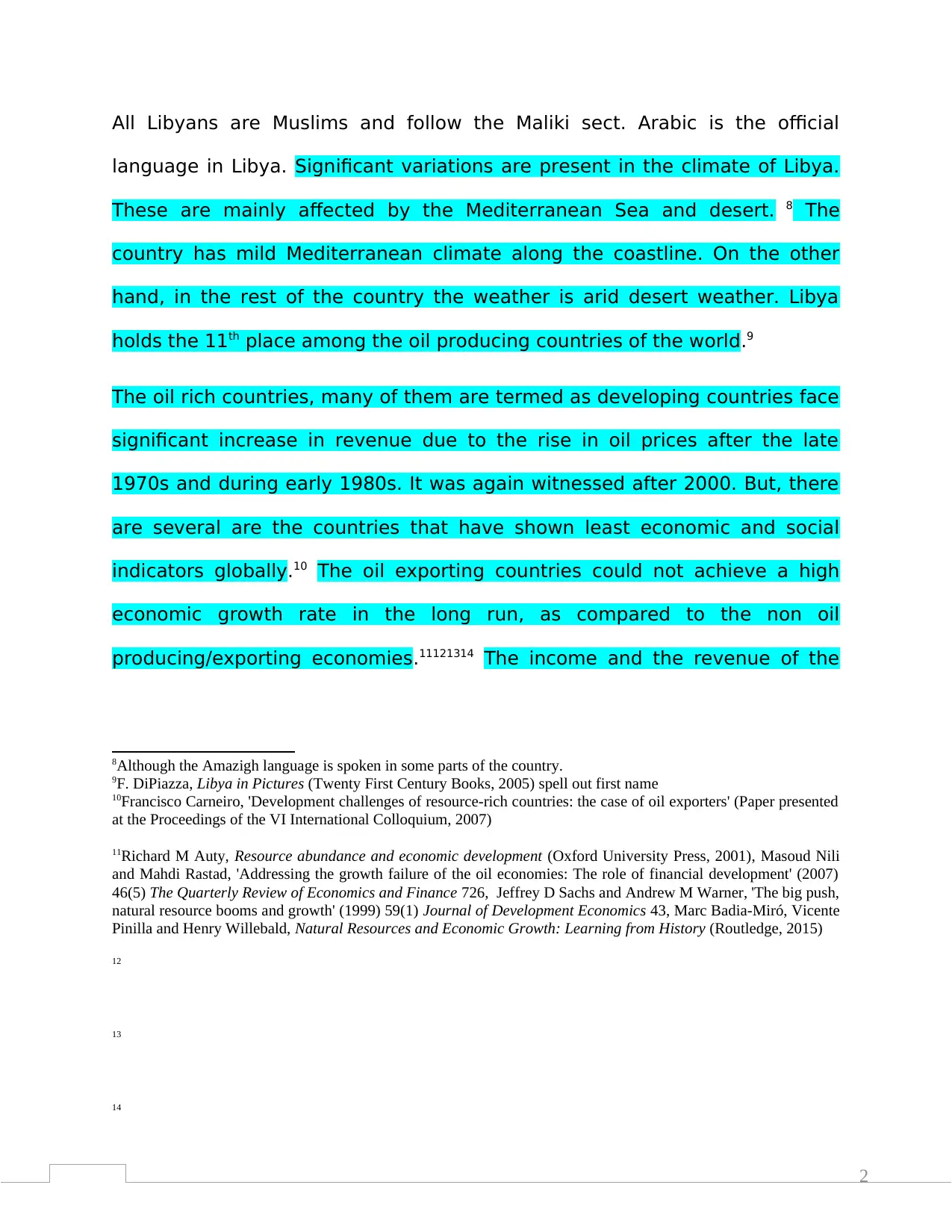
2
All Libyans are Muslims and follow the Maliki sect. Arabic is the official
language in Libya. Significant variations are present in the climate of Libya.
These are mainly affected by the Mediterranean Sea and desert. 8 The
country has mild Mediterranean climate along the coastline. On the other
hand, in the rest of the country the weather is arid desert weather. Libya
holds the 11th place among the oil producing countries of the world.9
The oil rich countries, many of them are termed as developing countries face
significant increase in revenue due to the rise in oil prices after the late
1970s and during early 1980s. It was again witnessed after 2000. But, there
are several are the countries that have shown least economic and social
indicators globally.10 The oil exporting countries could not achieve a high
economic growth rate in the long run, as compared to the non oil
producing/exporting economies.11121314 The income and the revenue of the
8Although the Amazigh language is spoken in some parts of the country.
9F. DiPiazza, Libya in Pictures (Twenty First Century Books, 2005) spell out first name
10Francisco Carneiro, 'Development challenges of resource-rich countries: the case of oil exporters' (Paper presented
at the Proceedings of the VI International Colloquium, 2007)
11Richard M Auty, Resource abundance and economic development (Oxford University Press, 2001), Masoud Nili
and Mahdi Rastad, 'Addressing the growth failure of the oil economies: The role of financial development' (2007)
46(5) The Quarterly Review of Economics and Finance 726, Jeffrey D Sachs and Andrew M Warner, 'The big push,
natural resource booms and growth' (1999) 59(1) Journal of Development Economics 43, Marc Badia-Miró, Vicente
Pinilla and Henry Willebald, Natural Resources and Economic Growth: Learning from History (Routledge, 2015)
12
13
14
All Libyans are Muslims and follow the Maliki sect. Arabic is the official
language in Libya. Significant variations are present in the climate of Libya.
These are mainly affected by the Mediterranean Sea and desert. 8 The
country has mild Mediterranean climate along the coastline. On the other
hand, in the rest of the country the weather is arid desert weather. Libya
holds the 11th place among the oil producing countries of the world.9
The oil rich countries, many of them are termed as developing countries face
significant increase in revenue due to the rise in oil prices after the late
1970s and during early 1980s. It was again witnessed after 2000. But, there
are several are the countries that have shown least economic and social
indicators globally.10 The oil exporting countries could not achieve a high
economic growth rate in the long run, as compared to the non oil
producing/exporting economies.11121314 The income and the revenue of the
8Although the Amazigh language is spoken in some parts of the country.
9F. DiPiazza, Libya in Pictures (Twenty First Century Books, 2005) spell out first name
10Francisco Carneiro, 'Development challenges of resource-rich countries: the case of oil exporters' (Paper presented
at the Proceedings of the VI International Colloquium, 2007)
11Richard M Auty, Resource abundance and economic development (Oxford University Press, 2001), Masoud Nili
and Mahdi Rastad, 'Addressing the growth failure of the oil economies: The role of financial development' (2007)
46(5) The Quarterly Review of Economics and Finance 726, Jeffrey D Sachs and Andrew M Warner, 'The big push,
natural resource booms and growth' (1999) 59(1) Journal of Development Economics 43, Marc Badia-Miró, Vicente
Pinilla and Henry Willebald, Natural Resources and Economic Growth: Learning from History (Routledge, 2015)
12
13
14
Paraphrase This Document
Need a fresh take? Get an instant paraphrase of this document with our AI Paraphraser
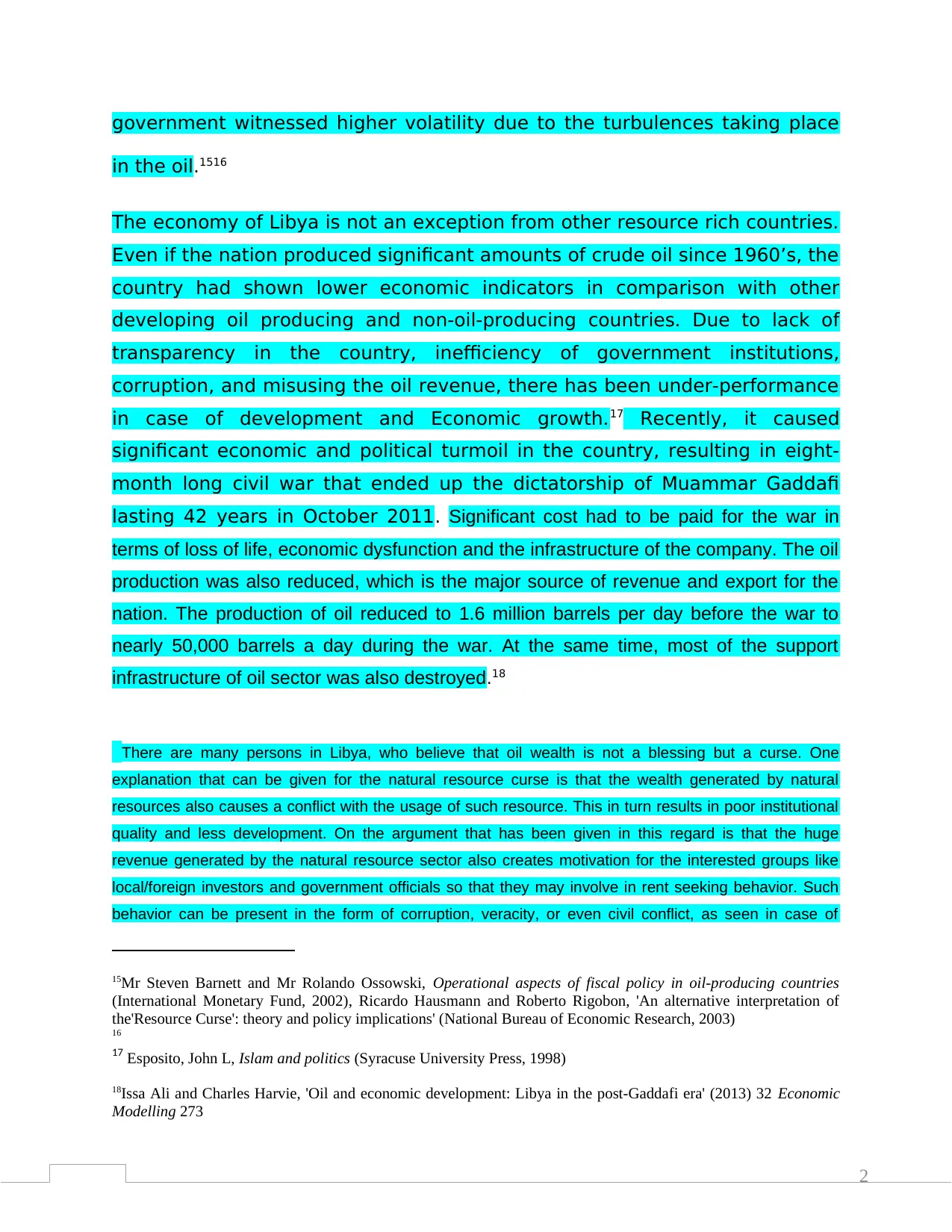
2
government witnessed higher volatility due to the turbulences taking place
in the oil.1516
The economy of Libya is not an exception from other resource rich countries.
Even if the nation produced significant amounts of crude oil since 1960’s, the
country had shown lower economic indicators in comparison with other
developing oil producing and non-oil-producing countries. Due to lack of
transparency in the country, inefficiency of government institutions,
corruption, and misusing the oil revenue, there has been under-performance
in case of development and Economic growth.17 Recently, it caused
significant economic and political turmoil in the country, resulting in eight-
month long civil war that ended up the dictatorship of Muammar Gaddafi
lasting 42 years in October 2011. Significant cost had to be paid for the war in
terms of loss of life, economic dysfunction and the infrastructure of the company. The oil
production was also reduced, which is the major source of revenue and export for the
nation. The production of oil reduced to 1.6 million barrels per day before the war to
nearly 50,000 barrels a day during the war. At the same time, most of the support
infrastructure of oil sector was also destroyed.18
There are many persons in Libya, who believe that oil wealth is not a blessing but a curse. One
explanation that can be given for the natural resource curse is that the wealth generated by natural
resources also causes a conflict with the usage of such resource. This in turn results in poor institutional
quality and less development. On the argument that has been given in this regard is that the huge
revenue generated by the natural resource sector also creates motivation for the interested groups like
local/foreign investors and government officials so that they may involve in rent seeking behavior. Such
behavior can be present in the form of corruption, veracity, or even civil conflict, as seen in case of
15Mr Steven Barnett and Mr Rolando Ossowski, Operational aspects of fiscal policy in oil-producing countries
(International Monetary Fund, 2002), Ricardo Hausmann and Roberto Rigobon, 'An alternative interpretation of
the'Resource Curse': theory and policy implications' (National Bureau of Economic Research, 2003)
16
17 Esposito, John L, Islam and politics (Syracuse University Press, 1998)
18Issa Ali and Charles Harvie, 'Oil and economic development: Libya in the post-Gaddafi era' (2013) 32 Economic
Modelling 273
government witnessed higher volatility due to the turbulences taking place
in the oil.1516
The economy of Libya is not an exception from other resource rich countries.
Even if the nation produced significant amounts of crude oil since 1960’s, the
country had shown lower economic indicators in comparison with other
developing oil producing and non-oil-producing countries. Due to lack of
transparency in the country, inefficiency of government institutions,
corruption, and misusing the oil revenue, there has been under-performance
in case of development and Economic growth.17 Recently, it caused
significant economic and political turmoil in the country, resulting in eight-
month long civil war that ended up the dictatorship of Muammar Gaddafi
lasting 42 years in October 2011. Significant cost had to be paid for the war in
terms of loss of life, economic dysfunction and the infrastructure of the company. The oil
production was also reduced, which is the major source of revenue and export for the
nation. The production of oil reduced to 1.6 million barrels per day before the war to
nearly 50,000 barrels a day during the war. At the same time, most of the support
infrastructure of oil sector was also destroyed.18
There are many persons in Libya, who believe that oil wealth is not a blessing but a curse. One
explanation that can be given for the natural resource curse is that the wealth generated by natural
resources also causes a conflict with the usage of such resource. This in turn results in poor institutional
quality and less development. On the argument that has been given in this regard is that the huge
revenue generated by the natural resource sector also creates motivation for the interested groups like
local/foreign investors and government officials so that they may involve in rent seeking behavior. Such
behavior can be present in the form of corruption, veracity, or even civil conflict, as seen in case of
15Mr Steven Barnett and Mr Rolando Ossowski, Operational aspects of fiscal policy in oil-producing countries
(International Monetary Fund, 2002), Ricardo Hausmann and Roberto Rigobon, 'An alternative interpretation of
the'Resource Curse': theory and policy implications' (National Bureau of Economic Research, 2003)
16
17 Esposito, John L, Islam and politics (Syracuse University Press, 1998)
18Issa Ali and Charles Harvie, 'Oil and economic development: Libya in the post-Gaddafi era' (2013) 32 Economic
Modelling 273
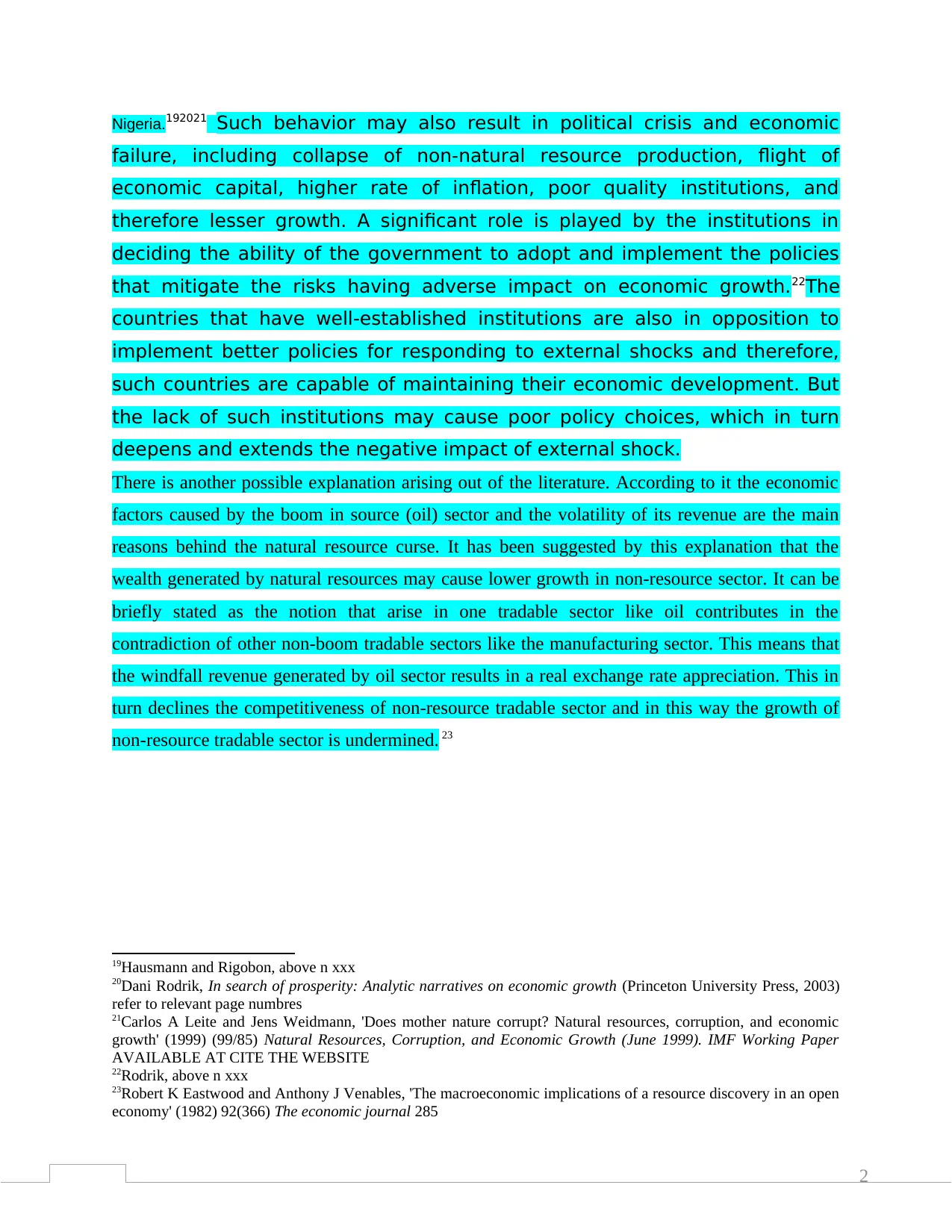
2
Nigeria.192021 Such behavior may also result in political crisis and economic
failure, including collapse of non-natural resource production, flight of
economic capital, higher rate of inflation, poor quality institutions, and
therefore lesser growth. A significant role is played by the institutions in
deciding the ability of the government to adopt and implement the policies
that mitigate the risks having adverse impact on economic growth.22The
countries that have well-established institutions are also in opposition to
implement better policies for responding to external shocks and therefore,
such countries are capable of maintaining their economic development. But
the lack of such institutions may cause poor policy choices, which in turn
deepens and extends the negative impact of external shock.
There is another possible explanation arising out of the literature. According to it the economic
factors caused by the boom in source (oil) sector and the volatility of its revenue are the main
reasons behind the natural resource curse. It has been suggested by this explanation that the
wealth generated by natural resources may cause lower growth in non-resource sector. It can be
briefly stated as the notion that arise in one tradable sector like oil contributes in the
contradiction of other non-boom tradable sectors like the manufacturing sector. This means that
the windfall revenue generated by oil sector results in a real exchange rate appreciation. This in
turn declines the competitiveness of non-resource tradable sector and in this way the growth of
non-resource tradable sector is undermined. 23
19Hausmann and Rigobon, above n xxx
20Dani Rodrik, In search of prosperity: Analytic narratives on economic growth (Princeton University Press, 2003)
refer to relevant page numbres
21Carlos A Leite and Jens Weidmann, 'Does mother nature corrupt? Natural resources, corruption, and economic
growth' (1999) (99/85) Natural Resources, Corruption, and Economic Growth (June 1999). IMF Working Paper
AVAILABLE AT CITE THE WEBSITE
22Rodrik, above n xxx
23Robert K Eastwood and Anthony J Venables, 'The macroeconomic implications of a resource discovery in an open
economy' (1982) 92(366) The economic journal 285
Nigeria.192021 Such behavior may also result in political crisis and economic
failure, including collapse of non-natural resource production, flight of
economic capital, higher rate of inflation, poor quality institutions, and
therefore lesser growth. A significant role is played by the institutions in
deciding the ability of the government to adopt and implement the policies
that mitigate the risks having adverse impact on economic growth.22The
countries that have well-established institutions are also in opposition to
implement better policies for responding to external shocks and therefore,
such countries are capable of maintaining their economic development. But
the lack of such institutions may cause poor policy choices, which in turn
deepens and extends the negative impact of external shock.
There is another possible explanation arising out of the literature. According to it the economic
factors caused by the boom in source (oil) sector and the volatility of its revenue are the main
reasons behind the natural resource curse. It has been suggested by this explanation that the
wealth generated by natural resources may cause lower growth in non-resource sector. It can be
briefly stated as the notion that arise in one tradable sector like oil contributes in the
contradiction of other non-boom tradable sectors like the manufacturing sector. This means that
the windfall revenue generated by oil sector results in a real exchange rate appreciation. This in
turn declines the competitiveness of non-resource tradable sector and in this way the growth of
non-resource tradable sector is undermined. 23
19Hausmann and Rigobon, above n xxx
20Dani Rodrik, In search of prosperity: Analytic narratives on economic growth (Princeton University Press, 2003)
refer to relevant page numbres
21Carlos A Leite and Jens Weidmann, 'Does mother nature corrupt? Natural resources, corruption, and economic
growth' (1999) (99/85) Natural Resources, Corruption, and Economic Growth (June 1999). IMF Working Paper
AVAILABLE AT CITE THE WEBSITE
22Rodrik, above n xxx
23Robert K Eastwood and Anthony J Venables, 'The macroeconomic implications of a resource discovery in an open
economy' (1982) 92(366) The economic journal 285
⊘ This is a preview!⊘
Do you want full access?
Subscribe today to unlock all pages.

Trusted by 1+ million students worldwide
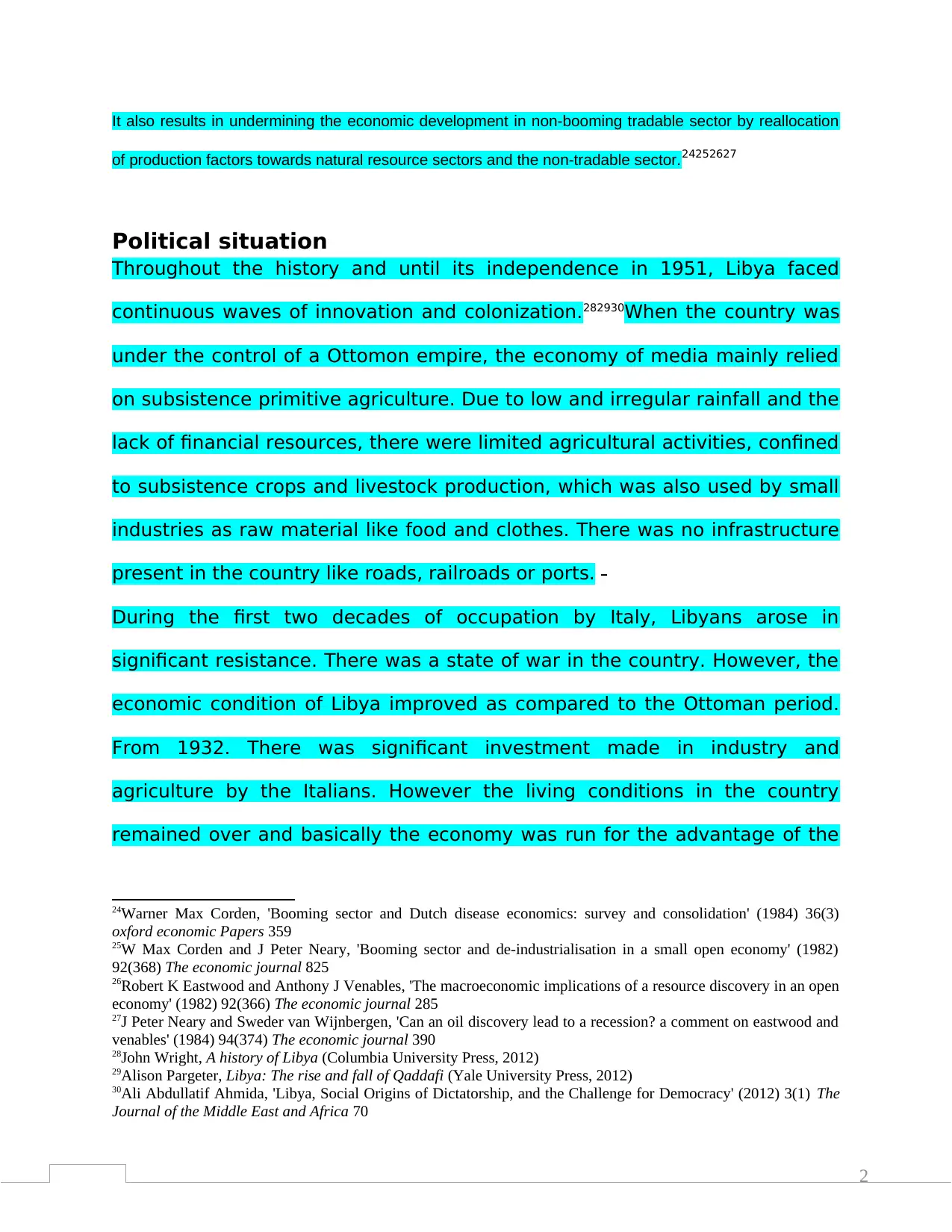
2
It also results in undermining the economic development in non-booming tradable sector by reallocation
of production factors towards natural resource sectors and the non-tradable sector.24252627
Political situation
Throughout the history and until its independence in 1951, Libya faced
continuous waves of innovation and colonization.282930When the country was
under the control of a Ottomon empire, the economy of media mainly relied
on subsistence primitive agriculture. Due to low and irregular rainfall and the
lack of financial resources, there were limited agricultural activities, confined
to subsistence crops and livestock production, which was also used by small
industries as raw material like food and clothes. There was no infrastructure
present in the country like roads, railroads or ports.
During the first two decades of occupation by Italy, Libyans arose in
significant resistance. There was a state of war in the country. However, the
economic condition of Libya improved as compared to the Ottoman period.
From 1932. There was significant investment made in industry and
agriculture by the Italians. However the living conditions in the country
remained over and basically the economy was run for the advantage of the
24Warner Max Corden, 'Booming sector and Dutch disease economics: survey and consolidation' (1984) 36(3)
oxford economic Papers 359
25W Max Corden and J Peter Neary, 'Booming sector and de-industrialisation in a small open economy' (1982)
92(368) The economic journal 825
26Robert K Eastwood and Anthony J Venables, 'The macroeconomic implications of a resource discovery in an open
economy' (1982) 92(366) The economic journal 285
27J Peter Neary and Sweder van Wijnbergen, 'Can an oil discovery lead to a recession? a comment on eastwood and
venables' (1984) 94(374) The economic journal 390
28John Wright, A history of Libya (Columbia University Press, 2012)
29Alison Pargeter, Libya: The rise and fall of Qaddafi (Yale University Press, 2012)
30Ali Abdullatif Ahmida, 'Libya, Social Origins of Dictatorship, and the Challenge for Democracy' (2012) 3(1) The
Journal of the Middle East and Africa 70
It also results in undermining the economic development in non-booming tradable sector by reallocation
of production factors towards natural resource sectors and the non-tradable sector.24252627
Political situation
Throughout the history and until its independence in 1951, Libya faced
continuous waves of innovation and colonization.282930When the country was
under the control of a Ottomon empire, the economy of media mainly relied
on subsistence primitive agriculture. Due to low and irregular rainfall and the
lack of financial resources, there were limited agricultural activities, confined
to subsistence crops and livestock production, which was also used by small
industries as raw material like food and clothes. There was no infrastructure
present in the country like roads, railroads or ports.
During the first two decades of occupation by Italy, Libyans arose in
significant resistance. There was a state of war in the country. However, the
economic condition of Libya improved as compared to the Ottoman period.
From 1932. There was significant investment made in industry and
agriculture by the Italians. However the living conditions in the country
remained over and basically the economy was run for the advantage of the
24Warner Max Corden, 'Booming sector and Dutch disease economics: survey and consolidation' (1984) 36(3)
oxford economic Papers 359
25W Max Corden and J Peter Neary, 'Booming sector and de-industrialisation in a small open economy' (1982)
92(368) The economic journal 825
26Robert K Eastwood and Anthony J Venables, 'The macroeconomic implications of a resource discovery in an open
economy' (1982) 92(366) The economic journal 285
27J Peter Neary and Sweder van Wijnbergen, 'Can an oil discovery lead to a recession? a comment on eastwood and
venables' (1984) 94(374) The economic journal 390
28John Wright, A history of Libya (Columbia University Press, 2012)
29Alison Pargeter, Libya: The rise and fall of Qaddafi (Yale University Press, 2012)
30Ali Abdullatif Ahmida, 'Libya, Social Origins of Dictatorship, and the Challenge for Democracy' (2012) 3(1) The
Journal of the Middle East and Africa 70
Paraphrase This Document
Need a fresh take? Get an instant paraphrase of this document with our AI Paraphraser
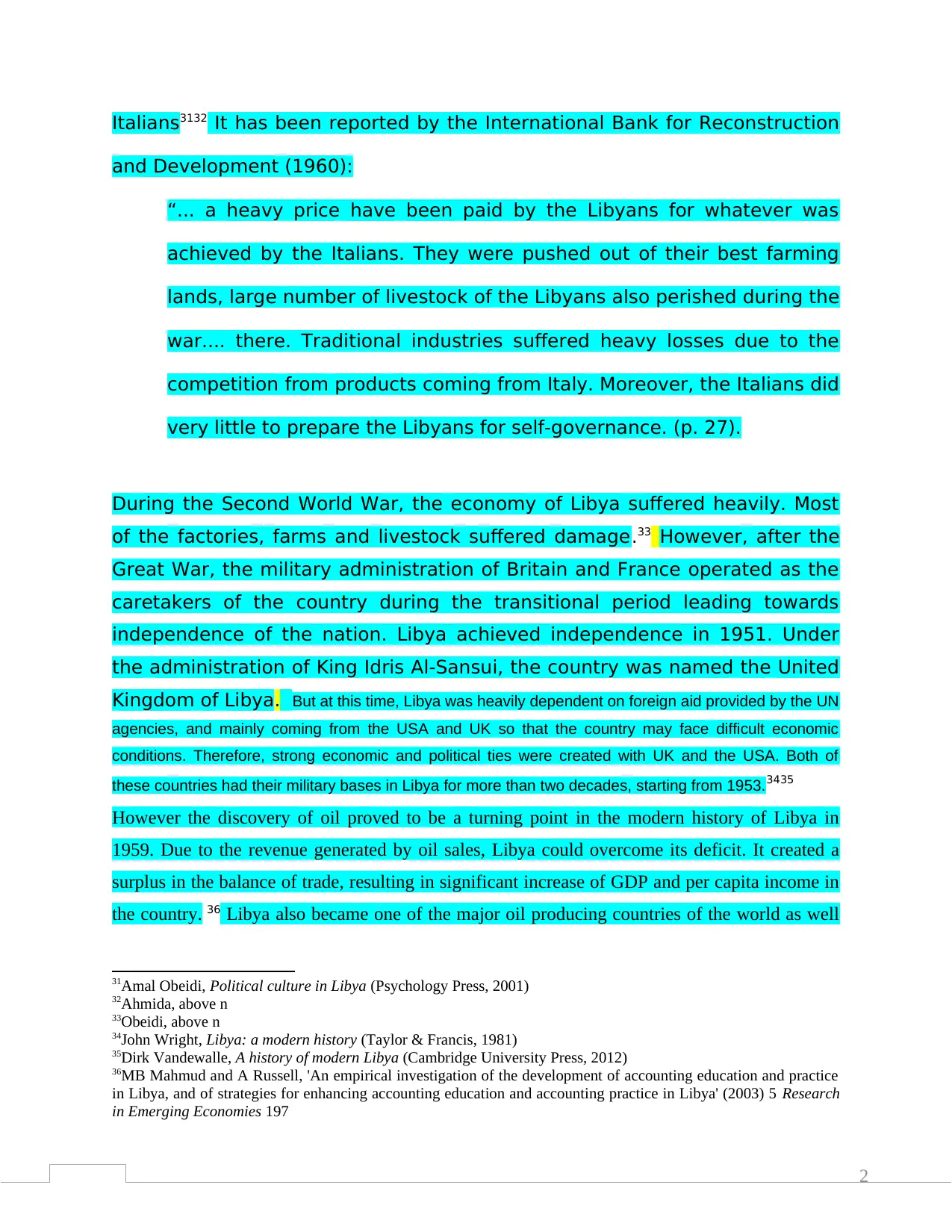
2
Italians3132 It has been reported by the International Bank for Reconstruction
and Development (1960):
“... a heavy price have been paid by the Libyans for whatever was
achieved by the Italians. They were pushed out of their best farming
lands, large number of livestock of the Libyans also perished during the
war.... there. Traditional industries suffered heavy losses due to the
competition from products coming from Italy. Moreover, the Italians did
very little to prepare the Libyans for self-governance. (p. 27).
During the Second World War, the economy of Libya suffered heavily. Most
of the factories, farms and livestock suffered damage.33 However, after the
Great War, the military administration of Britain and France operated as the
caretakers of the country during the transitional period leading towards
independence of the nation. Libya achieved independence in 1951. Under
the administration of King Idris Al-Sansui, the country was named the United
Kingdom of Libya. But at this time, Libya was heavily dependent on foreign aid provided by the UN
agencies, and mainly coming from the USA and UK so that the country may face difficult economic
conditions. Therefore, strong economic and political ties were created with UK and the USA. Both of
these countries had their military bases in Libya for more than two decades, starting from 1953.3435
However the discovery of oil proved to be a turning point in the modern history of Libya in
1959. Due to the revenue generated by oil sales, Libya could overcome its deficit. It created a
surplus in the balance of trade, resulting in significant increase of GDP and per capita income in
the country. 36 Libya also became one of the major oil producing countries of the world as well
31Amal Obeidi, Political culture in Libya (Psychology Press, 2001)
32Ahmida, above n
33Obeidi, above n
34John Wright, Libya: a modern history (Taylor & Francis, 1981)
35Dirk Vandewalle, A history of modern Libya (Cambridge University Press, 2012)
36MB Mahmud and A Russell, 'An empirical investigation of the development of accounting education and practice
in Libya, and of strategies for enhancing accounting education and accounting practice in Libya' (2003) 5 Research
in Emerging Economies 197
Italians3132 It has been reported by the International Bank for Reconstruction
and Development (1960):
“... a heavy price have been paid by the Libyans for whatever was
achieved by the Italians. They were pushed out of their best farming
lands, large number of livestock of the Libyans also perished during the
war.... there. Traditional industries suffered heavy losses due to the
competition from products coming from Italy. Moreover, the Italians did
very little to prepare the Libyans for self-governance. (p. 27).
During the Second World War, the economy of Libya suffered heavily. Most
of the factories, farms and livestock suffered damage.33 However, after the
Great War, the military administration of Britain and France operated as the
caretakers of the country during the transitional period leading towards
independence of the nation. Libya achieved independence in 1951. Under
the administration of King Idris Al-Sansui, the country was named the United
Kingdom of Libya. But at this time, Libya was heavily dependent on foreign aid provided by the UN
agencies, and mainly coming from the USA and UK so that the country may face difficult economic
conditions. Therefore, strong economic and political ties were created with UK and the USA. Both of
these countries had their military bases in Libya for more than two decades, starting from 1953.3435
However the discovery of oil proved to be a turning point in the modern history of Libya in
1959. Due to the revenue generated by oil sales, Libya could overcome its deficit. It created a
surplus in the balance of trade, resulting in significant increase of GDP and per capita income in
the country. 36 Libya also became one of the major oil producing countries of the world as well
31Amal Obeidi, Political culture in Libya (Psychology Press, 2001)
32Ahmida, above n
33Obeidi, above n
34John Wright, Libya: a modern history (Taylor & Francis, 1981)
35Dirk Vandewalle, A history of modern Libya (Cambridge University Press, 2012)
36MB Mahmud and A Russell, 'An empirical investigation of the development of accounting education and practice
in Libya, and of strategies for enhancing accounting education and accounting practice in Libya' (2003) 5 Research
in Emerging Economies 197
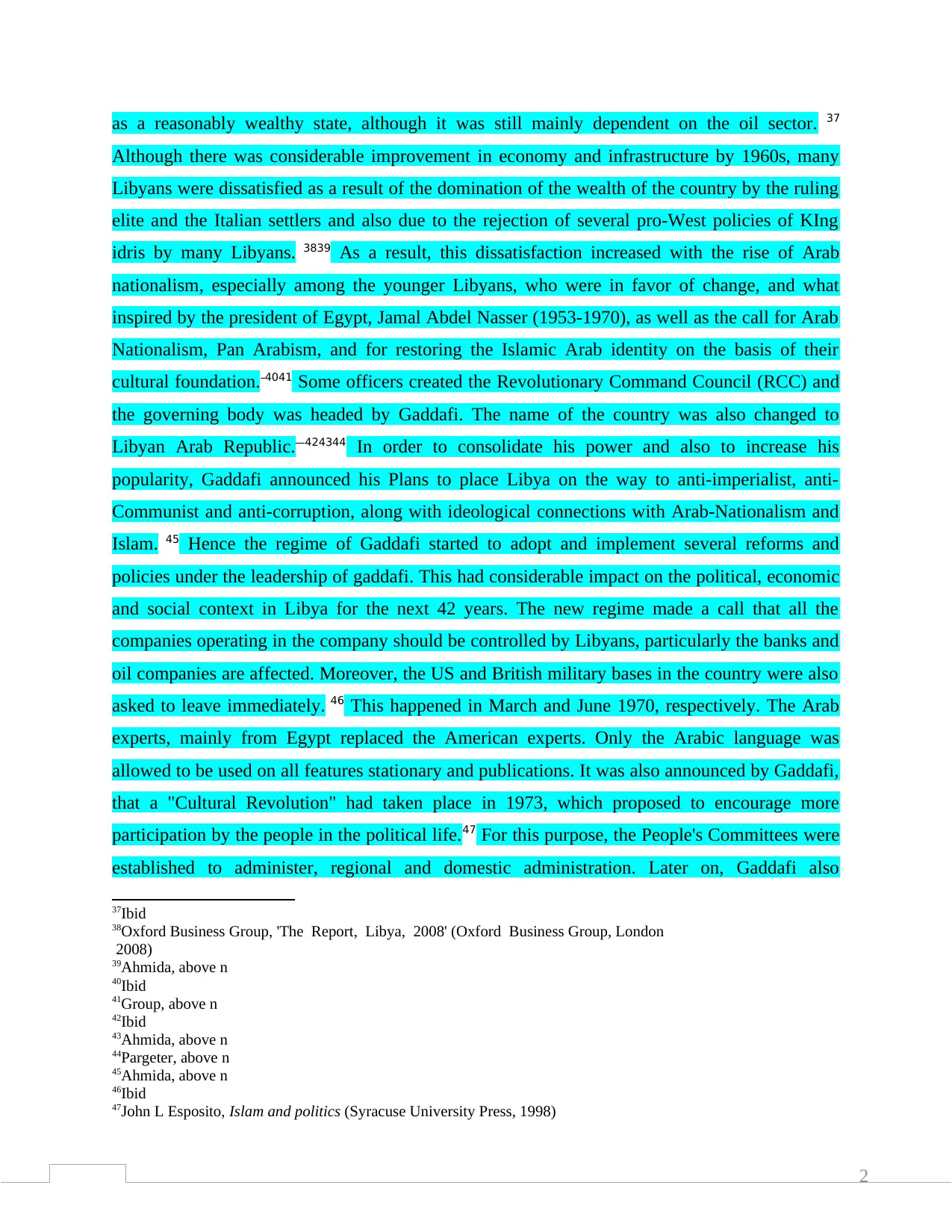
2
as a reasonably wealthy state, although it was still mainly dependent on the oil sector. 37
Although there was considerable improvement in economy and infrastructure by 1960s, many
Libyans were dissatisfied as a result of the domination of the wealth of the country by the ruling
elite and the Italian settlers and also due to the rejection of several pro-West policies of KIng
idris by many Libyans. 3839 As a result, this dissatisfaction increased with the rise of Arab
nationalism, especially among the younger Libyans, who were in favor of change, and what
inspired by the president of Egypt, Jamal Abdel Nasser (1953-1970), as well as the call for Arab
Nationalism, Pan Arabism, and for restoring the Islamic Arab identity on the basis of their
cultural foundation. 4041 Some officers created the Revolutionary Command Council (RCC) and
the governing body was headed by Gaddafi. The name of the country was also changed to
Libyan Arab Republic. 424344 In order to consolidate his power and also to increase his
popularity, Gaddafi announced his Plans to place Libya on the way to anti-imperialist, anti-
Communist and anti-corruption, along with ideological connections with Arab-Nationalism and
Islam. 45 Hence the regime of Gaddafi started to adopt and implement several reforms and
policies under the leadership of gaddafi. This had considerable impact on the political, economic
and social context in Libya for the next 42 years. The new regime made a call that all the
companies operating in the company should be controlled by Libyans, particularly the banks and
oil companies are affected. Moreover, the US and British military bases in the country were also
asked to leave immediately. 46 This happened in March and June 1970, respectively. The Arab
experts, mainly from Egypt replaced the American experts. Only the Arabic language was
allowed to be used on all features stationary and publications. It was also announced by Gaddafi,
that a "Cultural Revolution" had taken place in 1973, which proposed to encourage more
participation by the people in the political life.47 For this purpose, the People's Committees were
established to administer, regional and domestic administration. Later on, Gaddafi also
37Ibid
38Oxford Business Group, 'The Report, Libya, 2008' (Oxford Business Group, London
2008)
39Ahmida, above n
40Ibid
41Group, above n
42Ibid
43Ahmida, above n
44Pargeter, above n
45Ahmida, above n
46Ibid
47John L Esposito, Islam and politics (Syracuse University Press, 1998)
as a reasonably wealthy state, although it was still mainly dependent on the oil sector. 37
Although there was considerable improvement in economy and infrastructure by 1960s, many
Libyans were dissatisfied as a result of the domination of the wealth of the country by the ruling
elite and the Italian settlers and also due to the rejection of several pro-West policies of KIng
idris by many Libyans. 3839 As a result, this dissatisfaction increased with the rise of Arab
nationalism, especially among the younger Libyans, who were in favor of change, and what
inspired by the president of Egypt, Jamal Abdel Nasser (1953-1970), as well as the call for Arab
Nationalism, Pan Arabism, and for restoring the Islamic Arab identity on the basis of their
cultural foundation. 4041 Some officers created the Revolutionary Command Council (RCC) and
the governing body was headed by Gaddafi. The name of the country was also changed to
Libyan Arab Republic. 424344 In order to consolidate his power and also to increase his
popularity, Gaddafi announced his Plans to place Libya on the way to anti-imperialist, anti-
Communist and anti-corruption, along with ideological connections with Arab-Nationalism and
Islam. 45 Hence the regime of Gaddafi started to adopt and implement several reforms and
policies under the leadership of gaddafi. This had considerable impact on the political, economic
and social context in Libya for the next 42 years. The new regime made a call that all the
companies operating in the company should be controlled by Libyans, particularly the banks and
oil companies are affected. Moreover, the US and British military bases in the country were also
asked to leave immediately. 46 This happened in March and June 1970, respectively. The Arab
experts, mainly from Egypt replaced the American experts. Only the Arabic language was
allowed to be used on all features stationary and publications. It was also announced by Gaddafi,
that a "Cultural Revolution" had taken place in 1973, which proposed to encourage more
participation by the people in the political life.47 For this purpose, the People's Committees were
established to administer, regional and domestic administration. Later on, Gaddafi also
37Ibid
38Oxford Business Group, 'The Report, Libya, 2008' (Oxford Business Group, London
2008)
39Ahmida, above n
40Ibid
41Group, above n
42Ibid
43Ahmida, above n
44Pargeter, above n
45Ahmida, above n
46Ibid
47John L Esposito, Islam and politics (Syracuse University Press, 1998)
⊘ This is a preview!⊘
Do you want full access?
Subscribe today to unlock all pages.

Trusted by 1+ million students worldwide
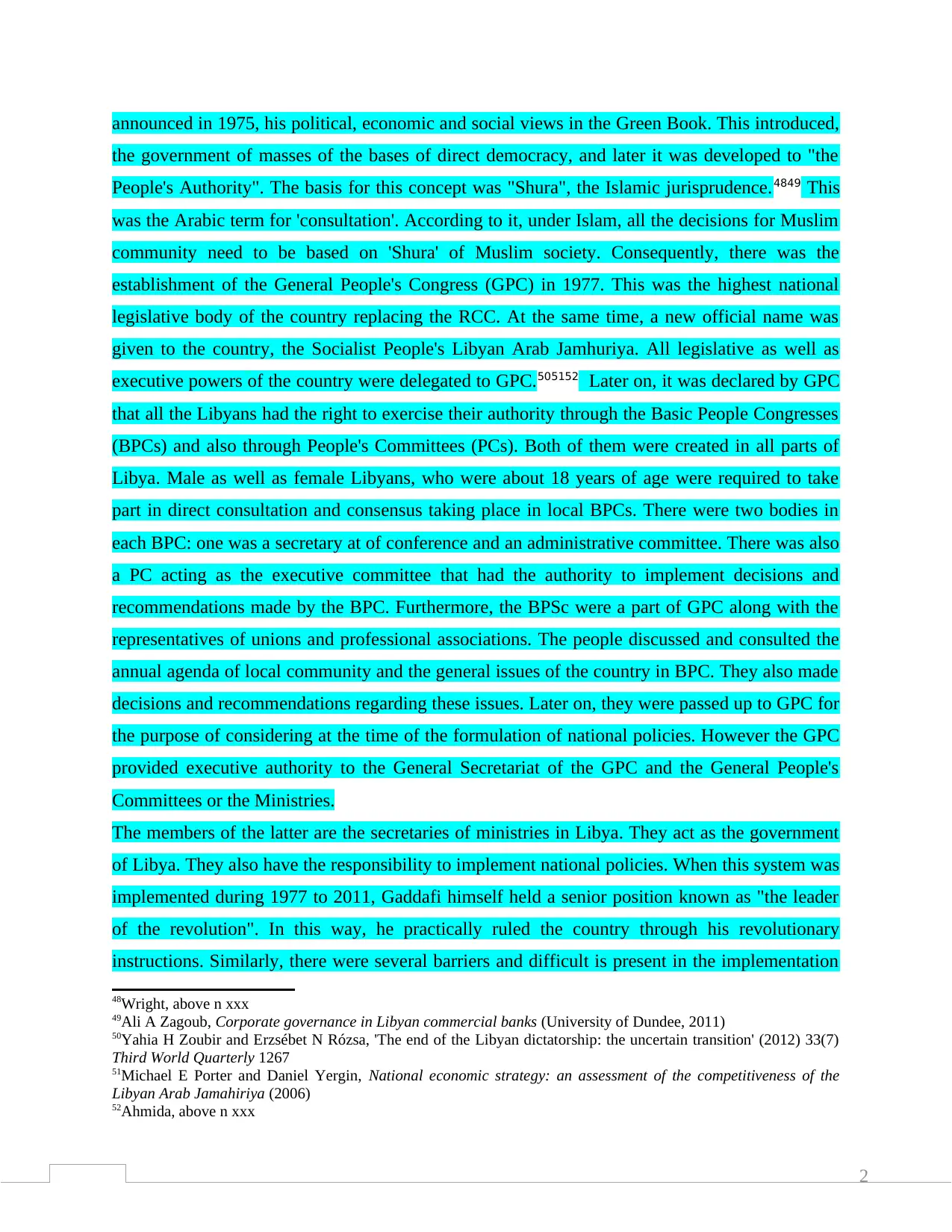
2
announced in 1975, his political, economic and social views in the Green Book. This introduced,
the government of masses of the bases of direct democracy, and later it was developed to "the
People's Authority". The basis for this concept was "Shura", the Islamic jurisprudence.4849 This
was the Arabic term for 'consultation'. According to it, under Islam, all the decisions for Muslim
community need to be based on 'Shura' of Muslim society. Consequently, there was the
establishment of the General People's Congress (GPC) in 1977. This was the highest national
legislative body of the country replacing the RCC. At the same time, a new official name was
given to the country, the Socialist People's Libyan Arab Jamhuriya. All legislative as well as
executive powers of the country were delegated to GPC.505152 Later on, it was declared by GPC
that all the Libyans had the right to exercise their authority through the Basic People Congresses
(BPCs) and also through People's Committees (PCs). Both of them were created in all parts of
Libya. Male as well as female Libyans, who were about 18 years of age were required to take
part in direct consultation and consensus taking place in local BPCs. There were two bodies in
each BPC: one was a secretary at of conference and an administrative committee. There was also
a PC acting as the executive committee that had the authority to implement decisions and
recommendations made by the BPC. Furthermore, the BPSc were a part of GPC along with the
representatives of unions and professional associations. The people discussed and consulted the
annual agenda of local community and the general issues of the country in BPC. They also made
decisions and recommendations regarding these issues. Later on, they were passed up to GPC for
the purpose of considering at the time of the formulation of national policies. However the GPC
provided executive authority to the General Secretariat of the GPC and the General People's
Committees or the Ministries.
The members of the latter are the secretaries of ministries in Libya. They act as the government
of Libya. They also have the responsibility to implement national policies. When this system was
implemented during 1977 to 2011, Gaddafi himself held a senior position known as "the leader
of the revolution". In this way, he practically ruled the country through his revolutionary
instructions. Similarly, there were several barriers and difficult is present in the implementation
48Wright, above n xxx
49Ali A Zagoub, Corporate governance in Libyan commercial banks (University of Dundee, 2011)
50Yahia H Zoubir and Erzsébet N Rózsa, 'The end of the Libyan dictatorship: the uncertain transition' (2012) 33(7)
Third World Quarterly 1267
51Michael E Porter and Daniel Yergin, National economic strategy: an assessment of the competitiveness of the
Libyan Arab Jamahiriya (2006)
52Ahmida, above n xxx
announced in 1975, his political, economic and social views in the Green Book. This introduced,
the government of masses of the bases of direct democracy, and later it was developed to "the
People's Authority". The basis for this concept was "Shura", the Islamic jurisprudence.4849 This
was the Arabic term for 'consultation'. According to it, under Islam, all the decisions for Muslim
community need to be based on 'Shura' of Muslim society. Consequently, there was the
establishment of the General People's Congress (GPC) in 1977. This was the highest national
legislative body of the country replacing the RCC. At the same time, a new official name was
given to the country, the Socialist People's Libyan Arab Jamhuriya. All legislative as well as
executive powers of the country were delegated to GPC.505152 Later on, it was declared by GPC
that all the Libyans had the right to exercise their authority through the Basic People Congresses
(BPCs) and also through People's Committees (PCs). Both of them were created in all parts of
Libya. Male as well as female Libyans, who were about 18 years of age were required to take
part in direct consultation and consensus taking place in local BPCs. There were two bodies in
each BPC: one was a secretary at of conference and an administrative committee. There was also
a PC acting as the executive committee that had the authority to implement decisions and
recommendations made by the BPC. Furthermore, the BPSc were a part of GPC along with the
representatives of unions and professional associations. The people discussed and consulted the
annual agenda of local community and the general issues of the country in BPC. They also made
decisions and recommendations regarding these issues. Later on, they were passed up to GPC for
the purpose of considering at the time of the formulation of national policies. However the GPC
provided executive authority to the General Secretariat of the GPC and the General People's
Committees or the Ministries.
The members of the latter are the secretaries of ministries in Libya. They act as the government
of Libya. They also have the responsibility to implement national policies. When this system was
implemented during 1977 to 2011, Gaddafi himself held a senior position known as "the leader
of the revolution". In this way, he practically ruled the country through his revolutionary
instructions. Similarly, there were several barriers and difficult is present in the implementation
48Wright, above n xxx
49Ali A Zagoub, Corporate governance in Libyan commercial banks (University of Dundee, 2011)
50Yahia H Zoubir and Erzsébet N Rózsa, 'The end of the Libyan dictatorship: the uncertain transition' (2012) 33(7)
Third World Quarterly 1267
51Michael E Porter and Daniel Yergin, National economic strategy: an assessment of the competitiveness of the
Libyan Arab Jamahiriya (2006)
52Ahmida, above n xxx
Paraphrase This Document
Need a fresh take? Get an instant paraphrase of this document with our AI Paraphraser
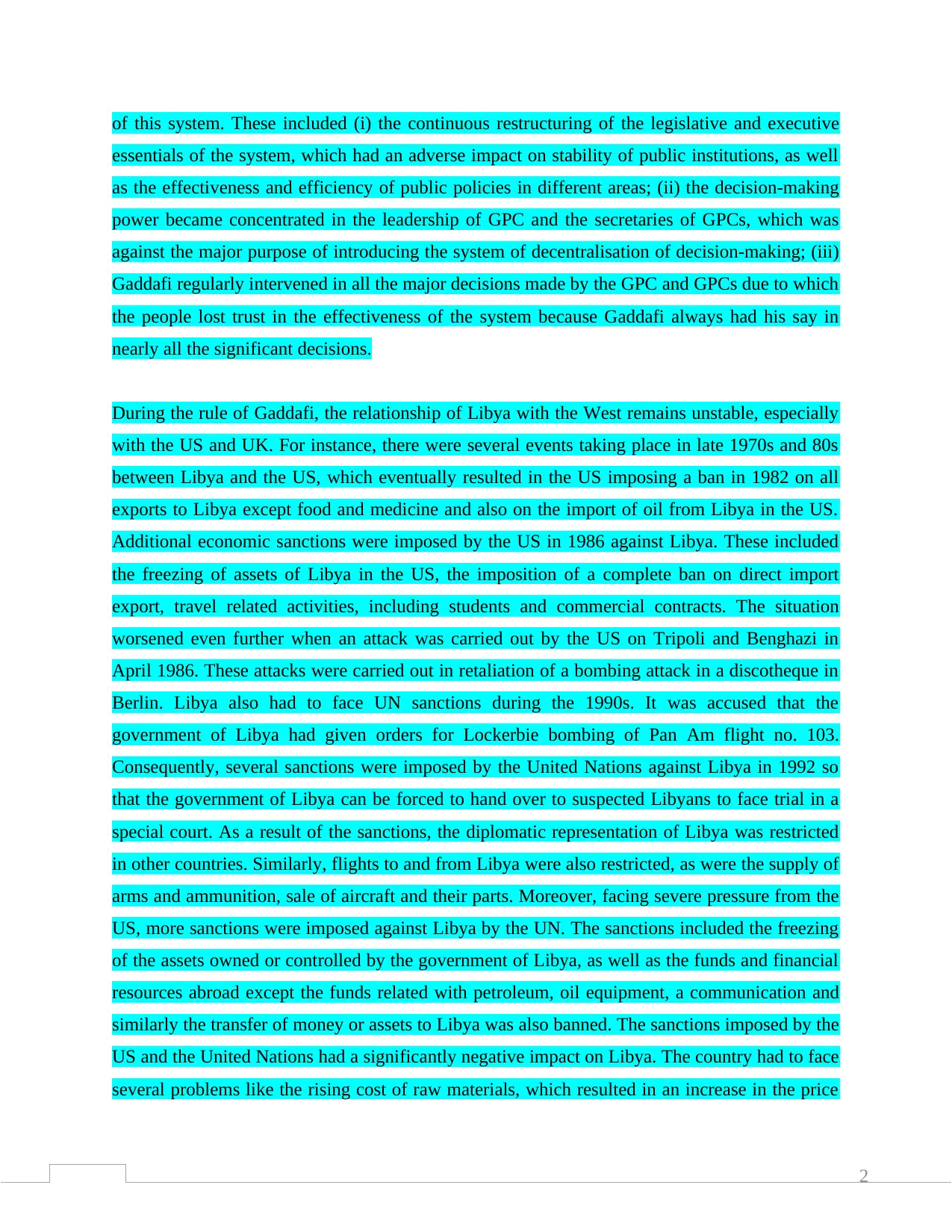
2
of this system. These included (i) the continuous restructuring of the legislative and executive
essentials of the system, which had an adverse impact on stability of public institutions, as well
as the effectiveness and efficiency of public policies in different areas; (ii) the decision-making
power became concentrated in the leadership of GPC and the secretaries of GPCs, which was
against the major purpose of introducing the system of decentralisation of decision-making; (iii)
Gaddafi regularly intervened in all the major decisions made by the GPC and GPCs due to which
the people lost trust in the effectiveness of the system because Gaddafi always had his say in
nearly all the significant decisions.
During the rule of Gaddafi, the relationship of Libya with the West remains unstable, especially
with the US and UK. For instance, there were several events taking place in late 1970s and 80s
between Libya and the US, which eventually resulted in the US imposing a ban in 1982 on all
exports to Libya except food and medicine and also on the import of oil from Libya in the US.
Additional economic sanctions were imposed by the US in 1986 against Libya. These included
the freezing of assets of Libya in the US, the imposition of a complete ban on direct import
export, travel related activities, including students and commercial contracts. The situation
worsened even further when an attack was carried out by the US on Tripoli and Benghazi in
April 1986. These attacks were carried out in retaliation of a bombing attack in a discotheque in
Berlin. Libya also had to face UN sanctions during the 1990s. It was accused that the
government of Libya had given orders for Lockerbie bombing of Pan Am flight no. 103.
Consequently, several sanctions were imposed by the United Nations against Libya in 1992 so
that the government of Libya can be forced to hand over to suspected Libyans to face trial in a
special court. As a result of the sanctions, the diplomatic representation of Libya was restricted
in other countries. Similarly, flights to and from Libya were also restricted, as were the supply of
arms and ammunition, sale of aircraft and their parts. Moreover, facing severe pressure from the
US, more sanctions were imposed against Libya by the UN. The sanctions included the freezing
of the assets owned or controlled by the government of Libya, as well as the funds and financial
resources abroad except the funds related with petroleum, oil equipment, a communication and
similarly the transfer of money or assets to Libya was also banned. The sanctions imposed by the
US and the United Nations had a significantly negative impact on Libya. The country had to face
several problems like the rising cost of raw materials, which resulted in an increase in the price
of this system. These included (i) the continuous restructuring of the legislative and executive
essentials of the system, which had an adverse impact on stability of public institutions, as well
as the effectiveness and efficiency of public policies in different areas; (ii) the decision-making
power became concentrated in the leadership of GPC and the secretaries of GPCs, which was
against the major purpose of introducing the system of decentralisation of decision-making; (iii)
Gaddafi regularly intervened in all the major decisions made by the GPC and GPCs due to which
the people lost trust in the effectiveness of the system because Gaddafi always had his say in
nearly all the significant decisions.
During the rule of Gaddafi, the relationship of Libya with the West remains unstable, especially
with the US and UK. For instance, there were several events taking place in late 1970s and 80s
between Libya and the US, which eventually resulted in the US imposing a ban in 1982 on all
exports to Libya except food and medicine and also on the import of oil from Libya in the US.
Additional economic sanctions were imposed by the US in 1986 against Libya. These included
the freezing of assets of Libya in the US, the imposition of a complete ban on direct import
export, travel related activities, including students and commercial contracts. The situation
worsened even further when an attack was carried out by the US on Tripoli and Benghazi in
April 1986. These attacks were carried out in retaliation of a bombing attack in a discotheque in
Berlin. Libya also had to face UN sanctions during the 1990s. It was accused that the
government of Libya had given orders for Lockerbie bombing of Pan Am flight no. 103.
Consequently, several sanctions were imposed by the United Nations against Libya in 1992 so
that the government of Libya can be forced to hand over to suspected Libyans to face trial in a
special court. As a result of the sanctions, the diplomatic representation of Libya was restricted
in other countries. Similarly, flights to and from Libya were also restricted, as were the supply of
arms and ammunition, sale of aircraft and their parts. Moreover, facing severe pressure from the
US, more sanctions were imposed against Libya by the UN. The sanctions included the freezing
of the assets owned or controlled by the government of Libya, as well as the funds and financial
resources abroad except the funds related with petroleum, oil equipment, a communication and
similarly the transfer of money or assets to Libya was also banned. The sanctions imposed by the
US and the United Nations had a significantly negative impact on Libya. The country had to face
several problems like the rising cost of raw materials, which resulted in an increase in the price
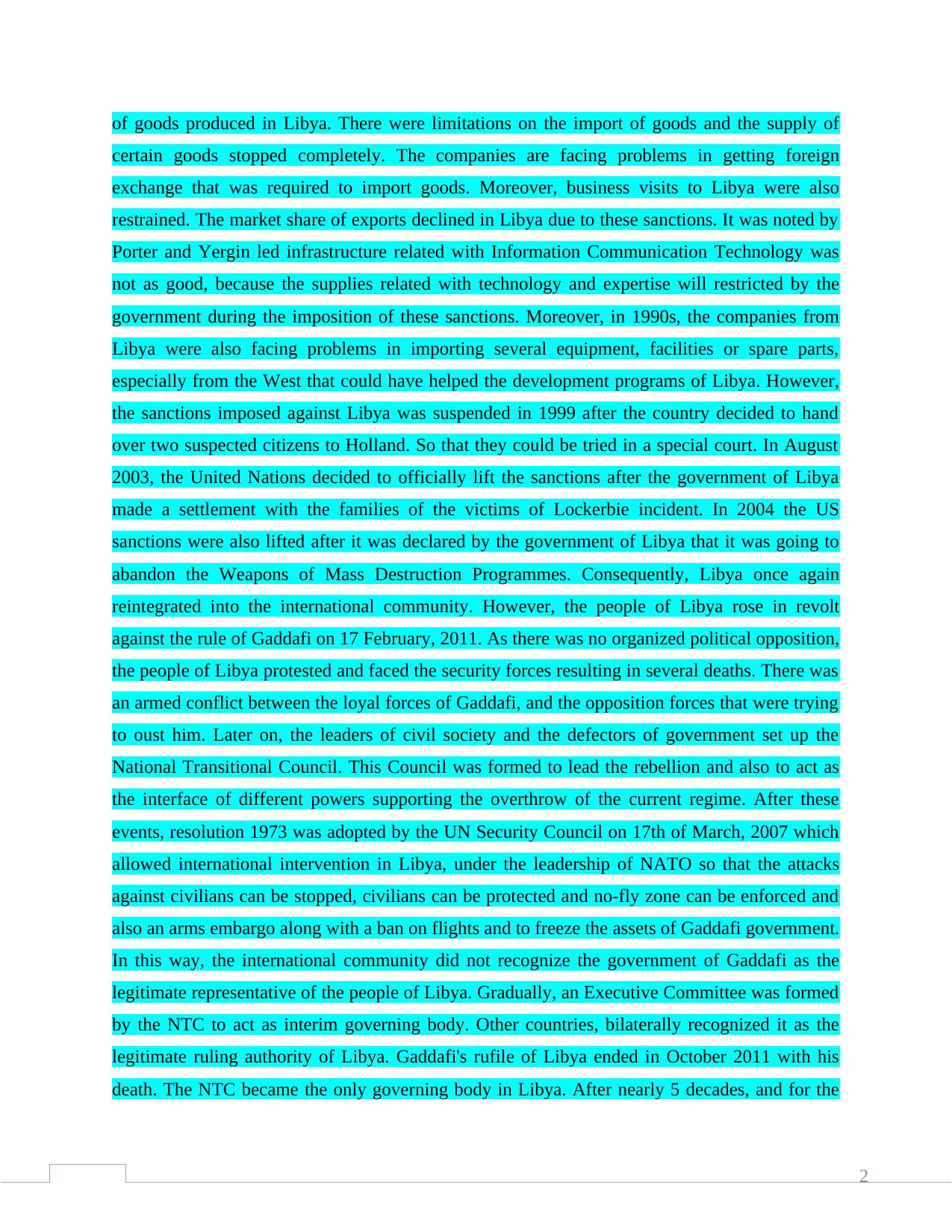
2
of goods produced in Libya. There were limitations on the import of goods and the supply of
certain goods stopped completely. The companies are facing problems in getting foreign
exchange that was required to import goods. Moreover, business visits to Libya were also
restrained. The market share of exports declined in Libya due to these sanctions. It was noted by
Porter and Yergin led infrastructure related with Information Communication Technology was
not as good, because the supplies related with technology and expertise will restricted by the
government during the imposition of these sanctions. Moreover, in 1990s, the companies from
Libya were also facing problems in importing several equipment, facilities or spare parts,
especially from the West that could have helped the development programs of Libya. However,
the sanctions imposed against Libya was suspended in 1999 after the country decided to hand
over two suspected citizens to Holland. So that they could be tried in a special court. In August
2003, the United Nations decided to officially lift the sanctions after the government of Libya
made a settlement with the families of the victims of Lockerbie incident. In 2004 the US
sanctions were also lifted after it was declared by the government of Libya that it was going to
abandon the Weapons of Mass Destruction Programmes. Consequently, Libya once again
reintegrated into the international community. However, the people of Libya rose in revolt
against the rule of Gaddafi on 17 February, 2011. As there was no organized political opposition,
the people of Libya protested and faced the security forces resulting in several deaths. There was
an armed conflict between the loyal forces of Gaddafi, and the opposition forces that were trying
to oust him. Later on, the leaders of civil society and the defectors of government set up the
National Transitional Council. This Council was formed to lead the rebellion and also to act as
the interface of different powers supporting the overthrow of the current regime. After these
events, resolution 1973 was adopted by the UN Security Council on 17th of March, 2007 which
allowed international intervention in Libya, under the leadership of NATO so that the attacks
against civilians can be stopped, civilians can be protected and no-fly zone can be enforced and
also an arms embargo along with a ban on flights and to freeze the assets of Gaddafi government.
In this way, the international community did not recognize the government of Gaddafi as the
legitimate representative of the people of Libya. Gradually, an Executive Committee was formed
by the NTC to act as interim governing body. Other countries, bilaterally recognized it as the
legitimate ruling authority of Libya. Gaddafi's rufile of Libya ended in October 2011 with his
death. The NTC became the only governing body in Libya. After nearly 5 decades, and for the
of goods produced in Libya. There were limitations on the import of goods and the supply of
certain goods stopped completely. The companies are facing problems in getting foreign
exchange that was required to import goods. Moreover, business visits to Libya were also
restrained. The market share of exports declined in Libya due to these sanctions. It was noted by
Porter and Yergin led infrastructure related with Information Communication Technology was
not as good, because the supplies related with technology and expertise will restricted by the
government during the imposition of these sanctions. Moreover, in 1990s, the companies from
Libya were also facing problems in importing several equipment, facilities or spare parts,
especially from the West that could have helped the development programs of Libya. However,
the sanctions imposed against Libya was suspended in 1999 after the country decided to hand
over two suspected citizens to Holland. So that they could be tried in a special court. In August
2003, the United Nations decided to officially lift the sanctions after the government of Libya
made a settlement with the families of the victims of Lockerbie incident. In 2004 the US
sanctions were also lifted after it was declared by the government of Libya that it was going to
abandon the Weapons of Mass Destruction Programmes. Consequently, Libya once again
reintegrated into the international community. However, the people of Libya rose in revolt
against the rule of Gaddafi on 17 February, 2011. As there was no organized political opposition,
the people of Libya protested and faced the security forces resulting in several deaths. There was
an armed conflict between the loyal forces of Gaddafi, and the opposition forces that were trying
to oust him. Later on, the leaders of civil society and the defectors of government set up the
National Transitional Council. This Council was formed to lead the rebellion and also to act as
the interface of different powers supporting the overthrow of the current regime. After these
events, resolution 1973 was adopted by the UN Security Council on 17th of March, 2007 which
allowed international intervention in Libya, under the leadership of NATO so that the attacks
against civilians can be stopped, civilians can be protected and no-fly zone can be enforced and
also an arms embargo along with a ban on flights and to freeze the assets of Gaddafi government.
In this way, the international community did not recognize the government of Gaddafi as the
legitimate representative of the people of Libya. Gradually, an Executive Committee was formed
by the NTC to act as interim governing body. Other countries, bilaterally recognized it as the
legitimate ruling authority of Libya. Gaddafi's rufile of Libya ended in October 2011 with his
death. The NTC became the only governing body in Libya. After nearly 5 decades, and for the
⊘ This is a preview!⊘
Do you want full access?
Subscribe today to unlock all pages.

Trusted by 1+ million students worldwide
1 out of 59
Related Documents
Your All-in-One AI-Powered Toolkit for Academic Success.
+13062052269
info@desklib.com
Available 24*7 on WhatsApp / Email
![[object Object]](/_next/static/media/star-bottom.7253800d.svg)
Unlock your academic potential
Copyright © 2020–2026 A2Z Services. All Rights Reserved. Developed and managed by ZUCOL.




